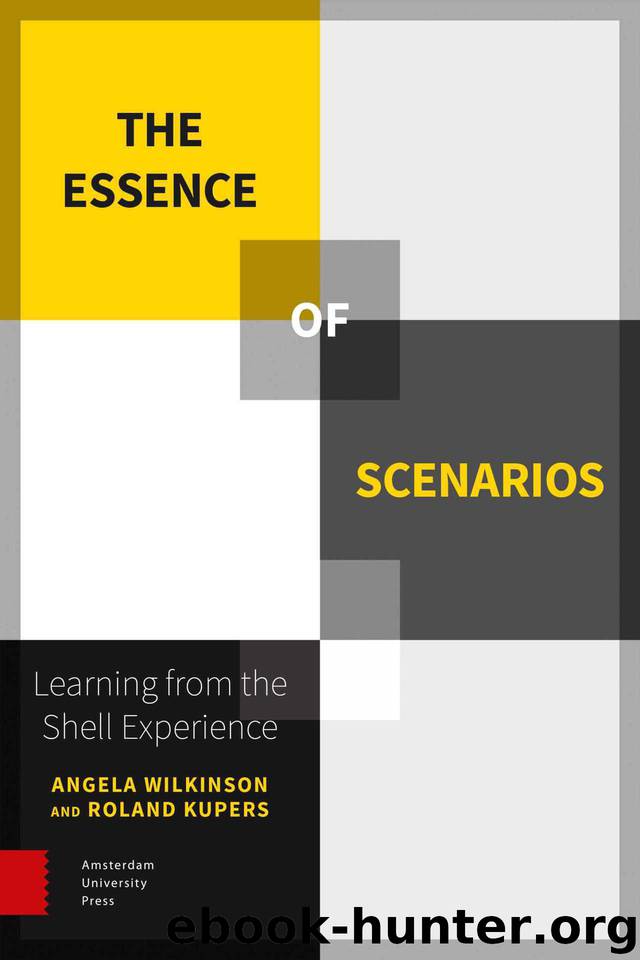The Essence of Scenarios by Wilkinson Angela

Author:Wilkinson, Angela [Wilkinson, Angela]
Language: eng
Format: epub
Publisher: Amsterdam University Press
Published: 2014-01-31T16:00:00+00:00
4 Pragmatic, Not Ideological
How did we actually use them? That varied from mandatory “thou shalt” use them when you think through your strategy [2001] to working with those businesses that really want to work with scenarios because they are open to using them as a vehicle to think things through. Mandating use didn’t go all that far in my experience.
– Doug McKay, Scenario Team Member, 1996-2002
If you take the top ten guys and ask for a summary of the long-term energy scenarios, you would get a pretty coherent story. If you asked the top ten guys about giving a good summary of the global scenarios, then you get a less good story.
– Jeroen van der Veer, Chairman CMD, 2004 and CEO, 2005-09
In Shell, the scenarios are useful, not truthful – that is, Shell does not believe its scenarios will or should come true – and whether they do so is not the point.
The Shell scenarios practice has long rejected preference as a guide for developing scenarios, even when Jaworski expressed a preference for one of his team’s 1992 scenarios over the other. And when CEO Jeroen van der Veer expressed a preference for Blueprints in 2006, he did so only after the scenario set had been fully developed (and causing a scramble to adjust them as we described). The Shell scenarios are not developed with the aim of identifying good or bad futures: after all, there is nothing to learn in Heaven and no one in interested in visiting Hell.
In spite of this long-standing policy, from time to time, scenarios have led to discussions about whether Shell ought not display leadership by advocating particular views of the future. For example, in 2001, the Shell Long Term Energy Scenarios (Business-as-Usual and Spirit of the Coming Age ) took steps in this direction by purposefully designing them to both meet the constraint of needing to limit global greenhouse gas emissions to realize the UNFCC target of less than 560ppmv and allowing for reasonable economic growth. The scenarios explore different paths for achieving this and the implications for the global energy mix.
Similarly, the 2013 Shell scenarios Mountains and Oceans take as predetermined the inevitability of climate change impacts not as a matter of strategic preference but rather on the basis of a combination of new analysis. First, developments in global climate change science suggested a much lower ‘safe limit’ (closer to pre-industrial levels) for avoiding irreversible and catastrophic climate change impacts. Second, developments in Shell’s in-house world energy model led to new insights about the inertia of the global energy system and the slower than previously expected process of technological transition.
An example of normative scenario practice can be found in the 2012 Global Energy Assessment, which “is unashamedly normative.” Led by former Shell scenario head Ged Davis and the lead author of the UNDP World Energy Assessment, Jose Goldenberg, it defines four goals that the scenarios will deliver, most notably, “stabilizing global climate change to 2°C above pre-industrial levels to be achieved in the 21st century.
Download
This site does not store any files on its server. We only index and link to content provided by other sites. Please contact the content providers to delete copyright contents if any and email us, we'll remove relevant links or contents immediately.
Hit Refresh by Satya Nadella(9123)
The Compound Effect by Darren Hardy(8941)
Change Your Questions, Change Your Life by Marilee Adams(7758)
Nudge - Improving Decisions about Health, Wealth, and Happiness by Thaler Sunstein(7690)
The Black Swan by Nassim Nicholas Taleb(7106)
Deep Work by Cal Newport(7063)
Rich Dad Poor Dad by Robert T. Kiyosaki(6603)
Daring Greatly by Brene Brown(6501)
Principles: Life and Work by Ray Dalio(6417)
Playing to Win_ How Strategy Really Works by A.G. Lafley & Roger L. Martin(6229)
Man-made Catastrophes and Risk Information Concealment by Dmitry Chernov & Didier Sornette(6003)
Big Magic: Creative Living Beyond Fear by Elizabeth Gilbert(5754)
Digital Minimalism by Cal Newport;(5748)
The Myth of the Strong Leader by Archie Brown(5496)
The Slight Edge by Jeff Olson(5410)
Discipline Equals Freedom by Jocko Willink(5378)
The Motivation Myth by Jeff Haden(5203)
The Laws of Human Nature by Robert Greene(5171)
Stone's Rules by Roger Stone(5080)
